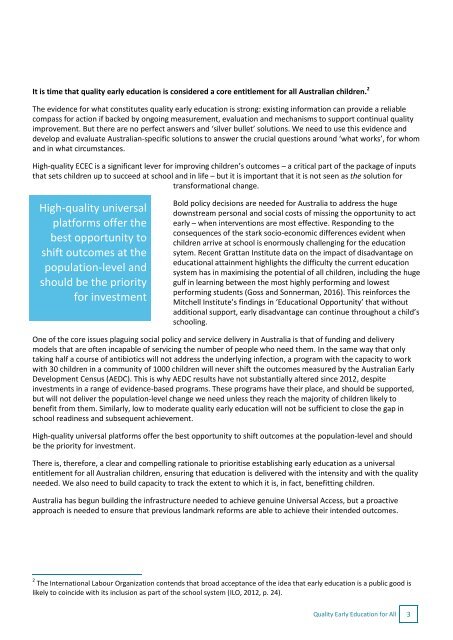Quality Early Education for All
Quality-Early-Education-for-All-FINAL
Quality-Early-Education-for-All-FINAL
Create successful ePaper yourself
Turn your PDF publications into a flip-book with our unique Google optimized e-Paper software.
It is time that quality early education is considered a core entitlement <strong>for</strong> all Australian children. 2<br />
The evidence <strong>for</strong> what constitutes quality early education is strong: existing in<strong>for</strong>mation can provide a reliable<br />
compass <strong>for</strong> action if backed by ongoing measurement, evaluation and mechanisms to support continual quality<br />
improvement. But there are no perfect answers and ‘silver bullet’ solutions. We need to use this evidence and<br />
develop and evaluate Australian-specific solutions to answer the crucial questions around ‘what works’, <strong>for</strong> whom<br />
and in what circumstances.<br />
High-quality ECEC is a significant lever <strong>for</strong> improving children’s outcomes – a critical part of the package of inputs<br />
that sets children up to succeed at school and in life – but it is important that it is not seen as the solution <strong>for</strong><br />
trans<strong>for</strong>mational change.<br />
High-quality universal<br />
plat<strong>for</strong>ms offer the<br />
best opportunity to<br />
shift outcomes at the<br />
population-level and<br />
should be the priority<br />
<strong>for</strong> investment<br />
Bold policy decisions are needed <strong>for</strong> Australia to address the huge<br />
downstream personal and social costs of missing the opportunity to act<br />
early – when interventions are most effective. Responding to the<br />
consequences of the stark socio-economic differences evident when<br />
children arrive at school is enormously challenging <strong>for</strong> the education<br />
sytem. Recent Grattan Institute data on the impact of disadvantage on<br />
educational attainment highlights the difficulty the current education<br />
system has in maximising the potential of all children, including the huge<br />
gulf in learning between the most highly per<strong>for</strong>ming and lowest<br />
per<strong>for</strong>ming students (Goss and Sonnerman, 2016). This rein<strong>for</strong>ces the<br />
Mitchell Institute’s findings in ‘<strong>Education</strong>al Opportunity’ that without<br />
additional support, early disadvantage can continue throughout a child’s<br />
schooling.<br />
One of the core issues plaguing social policy and service delivery in Australia is that of funding and delivery<br />
models that are often incapable of servicing the number of people who need them. In the same way that only<br />
taking half a course of antibiotics will not address the underlying infection, a program with the capacity to work<br />
with 30 children in a community of 1000 children will never shift the outcomes measured by the Australian <strong>Early</strong><br />
Development Census (AEDC). This is why AEDC results have not substantially altered since 2012, despite<br />
investments in a range of evidence-based programs. These programs have their place, and should be supported,<br />
but will not deliver the population-level change we need unless they reach the majority of children likely to<br />
benefit from them. Similarly, low to moderate quality early education will not be sufficient to close the gap in<br />
school readiness and subsequent achievement.<br />
High-quality universal plat<strong>for</strong>ms offer the best opportunity to shift outcomes at the population-level and should<br />
be the priority <strong>for</strong> investment.<br />
There is, there<strong>for</strong>e, a clear and compelling rationale to prioritise establishing early education as a universal<br />
entitlement <strong>for</strong> all Australian children, ensuring that education is delivered with the intensity and with the quality<br />
needed. We also need to build capacity to track the extent to which it is, in fact, benefitting children.<br />
Australia has begun building the infrastructure needed to achieve genuine Universal Access, but a proactive<br />
approach is needed to ensure that previous landmark re<strong>for</strong>ms are able to achieve their intended outcomes.<br />
2 The International Labour Organization contends that broad acceptance of the idea that early education is a public good is<br />
likely to coincide with its inclusion as part of the school system (ILO, 2012, p. 24).<br />
<strong>Quality</strong> <strong>Early</strong> <strong>Education</strong> <strong>for</strong> <strong>All</strong> 3


